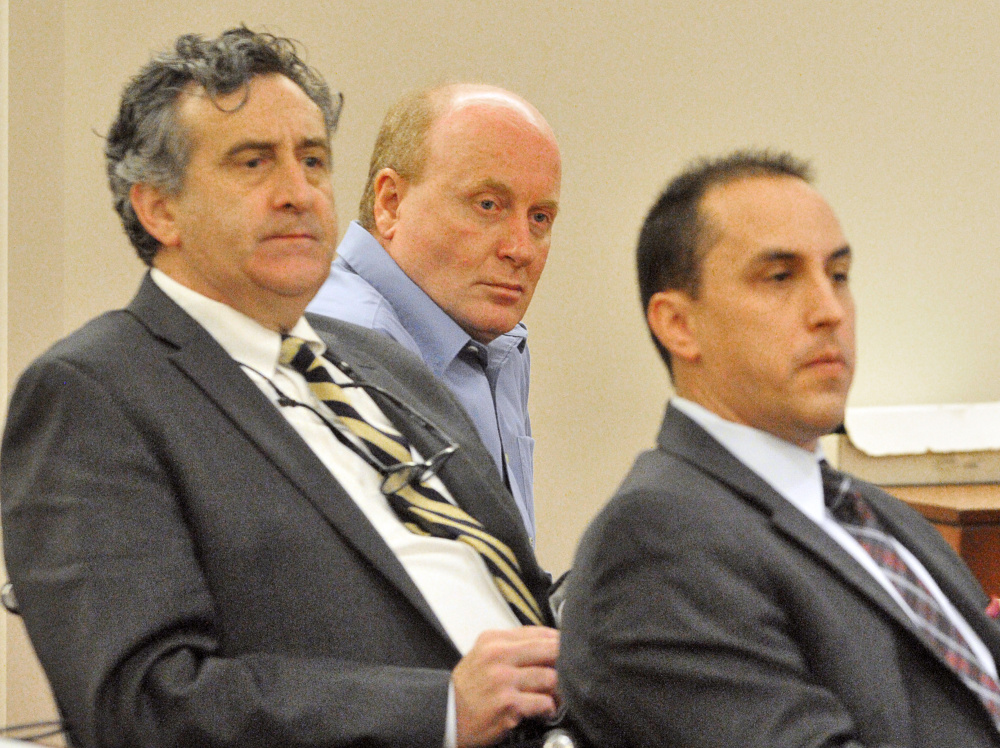PORTLAND — Roland Cummings, serving a life sentence for stabbing 92-year-old Aurele Fecteau to death as he slept in his Waterville home, wants an appeals court to overturn his conviction.
Attorney Tina Heather Nadeau argued Friday in front of the Maine Supreme Judicial Court, asking that Cummings’ murder conviction be vacated. Nadeau said the state’s charging of Cummings under the theories of both intentional murder as well as depraved indifference murder served to confuse jurors, as did the instructions the judge gave to jurors.
She told the seven justices on the bench, “In this case, the state did not present evidence that would meet the definition of what depraved indifference is.”
Fecteau’s body was found in his home at 33 Brooklyn Ave., Waterville, on May 23, 2014, by his eldest son, Ernest. Police theorize that Aurele Fecteau was killed around May 20, 2014.
Photos shown to the jury at the time of the trial showed blood smearing the pillow and his body at an angle on the bed and covered in a white blanket. Papers and a money box were strewn across the bed. The bureau drawers were wide open and a dark green shade pulled all the way down, blocking the window.
The guilty verdict in November 2015 followed six days of trial at the Capital Judicial Center.
Maine law says a person can be guilty of murder, among other things, if the person “engages in conduct that manifests a depraved indifference to the value of human life and that in fact causes the death of another human being.”
Nadeau said the 16 stab wounds the medical examiner found on Fecteau’s body were not enough to support the depraved indifference theory.
“Just because the number’s bigger doesn’t mean it’s depraved,” she said.
In a brief submitted before the argument, Nadeau wrote that Maine prosecutors have filed alternate theories for many years.
“For far too long, Maine courts have allowed prosecutors to charge defendants under both theories of murder, often in the same charge, creating a situation whereby depraved indifference is a ‘catch-all’ or ‘fallback’ charge, used to prop up weak intentional murder cases,” Nadeau wrote in a brief submitted prior to the argument.
The lawyer said the court should insist going forward that the state choose to pursue one form or the other prior to trial.
Nadeau also said, “Cummings did, however, repeatedly assert, during and after trial, that his alleged conduct did not constitute depravity and that the jury should not be instructed on that charge once evidence was closed.”
She urged the appeals court to “evaluate the sufficiency of the evidence on both theories of the murder to establish whether the conviction can stand.”
Nadeau also said evidence was insufficient to support his conviction under either theory.
“The strongest evidence the state presented against Cummings was the evidence that his DNA was on the out-turned pockets of three pairs of (Fecteau’s) pants recovered from his bedroom floor” and that Cummings had half-dollar coins and two rings identified as Fecteau’s.
At oral arguments, Nadeau told the justices that was all circumstantial evidence.
“I’m saying there were other people there, perhaps,” Nadeau said.
Defense attorneys argued at trial that Fecteau’s son David was a viable suspect in the murder. He testified during Cummings’ trial and repeatedly denied killing his father in response to a series of questions from one of the prosecutors, Assistant Attorney General Leane Zainea.
Zainea and several state police officers involved in the investigation watched the oral arguments Friday in Portland from a bench at the rear of the courtroom.
Cummings told investigators he had rifled through Fecteau’s pants looking for money when he stopped by to ask about doing odd jobs for him. Cummings was arrested on the murder charge about two weeks after Fecteau’s body was discovered.
The state wants Cummings’ conviction upheld. The brief filed by Assistant Attorney General Donald Macomber, who was also one of the prosecutors at trial, says the evidence at trial was sufficient to uphold a conviction under either theory and that the state was not required to choose one.
“The state presented abundant circumstantial evidence that it was Cummings that stabbed 92-year-old Aurele Fecteau 16 times as he lay in bed, thus causing his death,” Macomber wrote in his brief.
Chief Justice Leigh Saufley asked whether it would have been better to separate the charges in this case. Macomber said that is an option.
At the argument, Macomber said, “It was up to the jury to determine whether that rose to the level of depravity sufficient to meet the statute.”
Cummings, now 47, was sentenced to life in prison in January 2016. He is being held at the Maine State Prison. He did not attend the oral argument.
The supreme court issues rulings in writing, generally months after oral arguments take place.
Betty Adams — 621-5631
Twitter: @betadams
Send questions/comments to the editors.




Success. Please wait for the page to reload. If the page does not reload within 5 seconds, please refresh the page.
Enter your email and password to access comments.
Hi, to comment on stories you must . This profile is in addition to your subscription and website login.
Already have a commenting profile? .
Invalid username/password.
Please check your email to confirm and complete your registration.
Only subscribers are eligible to post comments. Please subscribe or login first for digital access. Here’s why.
Use the form below to reset your password. When you've submitted your account email, we will send an email with a reset code.